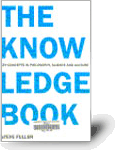![]()

The Knowledge Book: key concepts in philosophy, science and culture
Steven Fuller
abstract
"The Knowledge Book" is a unique interdisciplinary reference work for students and researchers concerned with the nature of knowledge. It is the first work of its kind to be organized on the assumption that whatever else knowledge might be, it is intrinsically social.
The book consists of over forty alphabetically arranged entries on key concepts at the intersection of philosophy and sociology - what used to be called "sociology of knowledge" but is now increasingly called "social epistemology". The entries cover concepts common to many disciplines that have, in recent years, devoted increasing attention to knowledge: cultural studies, communication studies, information science, education, policy studies and business studies. Special attention is given to concepts from the emerging field of science and technology studies.
Each entry presents a short, self-contained essay providing an overview of a concept and concludes with suggestions for further reading. All the entries are fully cross-referenced, allowing readers to both make connections and follow their own interests.
keywords
Knowledge's Theory, Knowledge, social epistemology, sociology of knowledge
catalogue card
Title: The Knowledge Book: key concepts in philosophy, science and culture
Author: Steve Fuller
Publication: Stocksfield: Acumen, cop. 2007
Subjects: sociology of knowledge, knowledge's theory
ISBN: 978-1-84465-098-9 (pbk), 978-1-84465-097-2 (hbk)
index
 The texts published in this journal, unless otherwise indicated, are subject to a Creative Commons Attribution-Noncommercial-NoDerivativeWorks 2.5 licence.
It may be copied, distributed and broadcast provided that the author and UOC Papers are cited. Commercial use and derivative works are not permitted. The full licence can be consulted on http://creativecommons.org/licenses/by-nc-nd/2.5/es/deed.en
The texts published in this journal, unless otherwise indicated, are subject to a Creative Commons Attribution-Noncommercial-NoDerivativeWorks 2.5 licence.
It may be copied, distributed and broadcast provided that the author and UOC Papers are cited. Commercial use and derivative works are not permitted. The full licence can be consulted on http://creativecommons.org/licenses/by-nc-nd/2.5/es/deed.en





